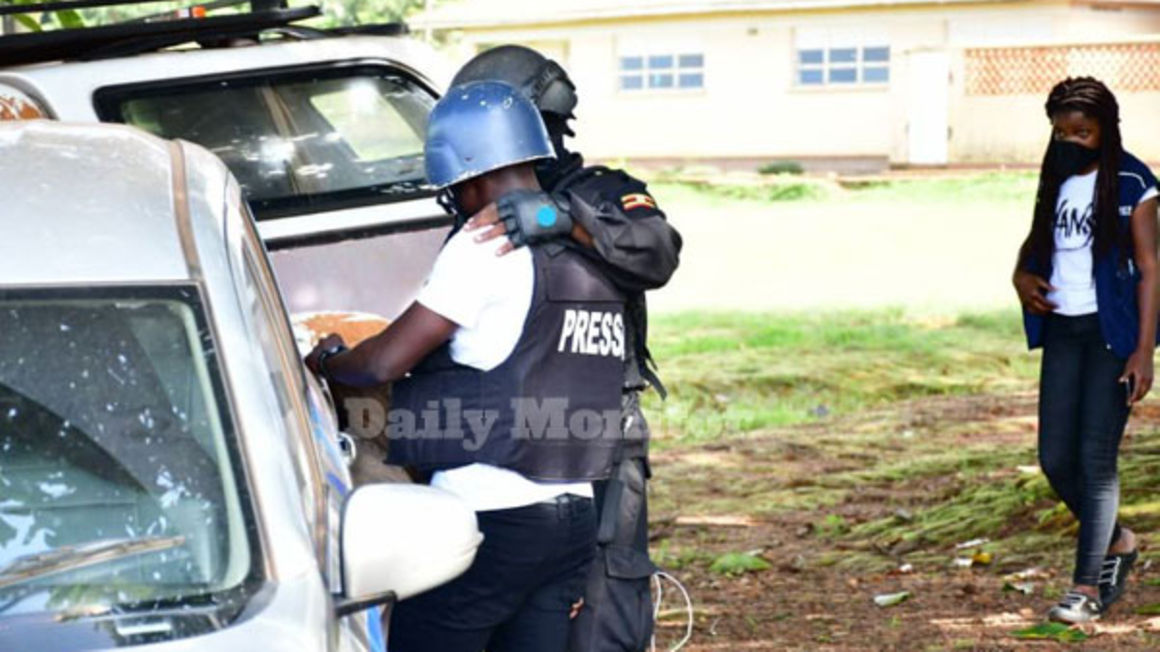Give journalists free hand to work

This photo taken on December 30, 2020 shows Nation Media Group journalist, Derrick Wandera who is attached to Daily Monitor, being led into a Police vehicle in Kalangala where NUP presidential candidate Robert Kyagulanyi was campaigning. PHOTO | ABUBAKER LUBOWA
What you need to know:
- The issue: Press freedom
- Our view: The current restriction of media spaces and right to work and earn a decent living are unacceptable.
The launch on Monday of Uganda Editors Guild in Kampala is a great first step in building solidarity among media managers, evolving internal mechanisms to raise, and address challenges, sue for their rights and also hold ourselves accountable. This also means media houses, their managers and editors now need to be given space to scrutinize own operations. The media houses must now hold their own to as strict ethical conduct and standards and rights as they would others. Even in cases where such internal resolutions fail, the security agencies should never rush to take the law into their own hands and militarise their responses. Or better still, refer to the supreme law of the land, our Constitution and courts of law, to resolve.
Commendably, the launch of the Guild was well-timed and significantly executed when journalists across the world on Monday marked World Press Freedom Day. Regrettably, the 2021 World Press Freedom Index ranking by Reporters without Borders (RSF) damns the state of media freedom across the East African Community partner states.
The report indicates that access to information by the media and their middleman’s role to pass on or share this information with our citizens is confined. Of the 180 countries ranked, the East African region member states fare poorly with Kenya graded at 102, Uganda 125, Tanzania 124, Rwanda 156, Burundi 147, and South Sudan at 136. The report is unequivocal that “Acts of intimidation and violence against reporters are an almost daily occurrence in Uganda. The security services … often target journalists and detain them arbitrarily.” The report adds that “Any criticism of the authorities can result in journalists being beaten, abducted or deprived of their equipment with impunity.”
In all, RSF logged more than 40 attacks on journalists and media in the final weeks. Since 2019, as rightly observed by RSF, the noose has been tightening to constrain journalists’ work. There have been barbaric attacks on journalists in line of duty by security agencies, raids of radio stations hosting Opposition figures, etc. Other restrictions have been denial of access to information by imposing social media tax, shutting off Facebook, and cutting off Internet access, which are vital for an informed citizenry and civic participation.
Both the state agencies and media houses should recognise that every journalist deserves the right to work, job security, and earning a decent wage. Sadly, the current restriction of media spaces and right to work and earn a decent living are wanting or outright unacceptable. Unless these are guaranteed, the challenge to journalists by Deputy Speaker Jacob Oulanyah, that they stick to code of ethics, stand their ground, and avoid being compromised while working on game-changing stories, won’t be easy.
Nonetheless, the journalists noble role to inform, educate, challenge, and shape public opinion can be realised when state agencies, corporate entities, and media house owners recognize that every journalist deserves the right to work, job security, and a decent wage. Sadly, the current restriction of media spaces and right to a decent living are unacceptable.




